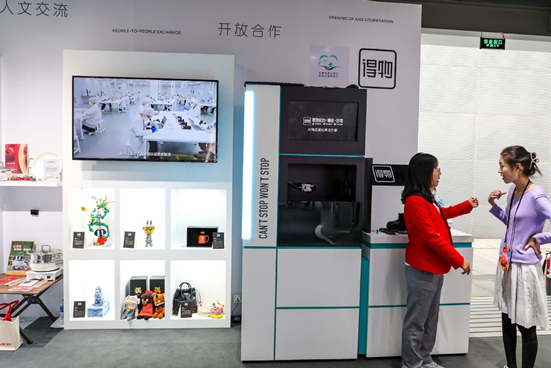By CHENG YU | China Daily |

A visitor (right) gets information from a staff member at the exhibition stand of Dewu, an e-tailer of fashion brands, during the sixth China International Import Expo in Shanghai on Nov 8. [Photo provided to China Daily]
Policies, removal of barriers seen accelerating evolution of over 50m private firms
A key pillar of the economy, China's private sector, comprising more than 50 million enterprises, is expected to see in 2024 a breakout year, riding the policy bonanza that marked last year, industry experts said.
A slew of supportive policies announced last year will be implemented with intense focus, generating real benefits for private enterprises this year, they said.
They further said private enterprises, which contribute over 50 percent of the country's tax revenue, 60 percent of GDP, 70 percent of technological innovation and 80 percent of urban jobs, are expected to play a bigger role in driving China's economic growth this year.
"This year, China's private sector will be less constrained and is expected to receive more encouragement and support from authorities. Private enterprises will also move forward with fewer burdens," said Dong Yu, executive vice-president of the China Institute for Development Planning at Tsinghua University.
Dong, who had also worked for the Office of the Central Committee for Financial and Economic Affairs, made the remarks after reviewing the leadership's vision for this year announced at the Central Economic Work Conference in December.
The tone-setting conference said the nation will implement a number of measures to strengthen private enterprises, including better market access, access to factors of production, fair law enforcement, and protection of rights and interests.
"In fact, many major tasks envisioned during the conference provide development directions for the private sector to take this year," Dong said. For instance, private enterprises are expected to help China develop new productivity boosters.
Wang Peng, a senior researcher at the Beijing Academy of Social Sciences, said potential measures this year could include the removal of institutional barriers restricting market access for private enterprises, strengthened fair law enforcement and increased financial support, including tax reductions and credit assistance.
Notably, the conference also emphasized efforts to implement new mechanisms for cooperation between the government and sources of private capital. The country will support the participation of private capital in "new infrastructure "and other areas, the leadership said during the conference. New infrastructure refers to high-tech facilities that use, or are related to, artificial intelligence, the latest telecom formats, the industrial internet and the internet of things (networks of devices that can connect and exchange data).
Song Xiangqing, a professor of the School of Government at Beijing Normal University, said private companies are expected to have more opportunities to play a bigger role in major national projects related to infrastructure, new urbanization, transportation and hydraulic engineering in the future.
"The government wants to remove those barriers that hinder the development of private enterprises. The government also aims to enable private enterprises to compete in the market at a higher level and in a larger field. It would activate the intrinsic ability of private enterprises to innovate and become more competitive on the global stage," Song said.